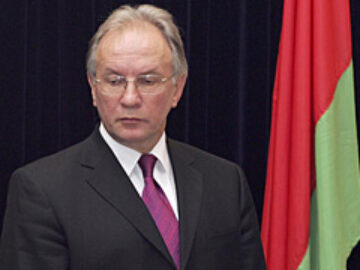Belarusian dictatorship has no intention of carrying out EU requirements

Summing up the results of the meeting with the European Union’s Troika in Brussels, Foreign Minister of Belarus Syarhei Martynau said that participation of countries in the Eastern Partnership program should not be stipulated by any conditions.
“The Eastern Partnership program should be all-encompassing by default. If it is not comprehensive, there is no sense in it,” Belarusian Foreign Minister said.
Earlier when publishing programs of the Eastern Partnership for Azerbaijan, Armenia, Georgia, Kazakhstan, Belarus and Ukraine, the European Commission stated that for full-fledged participation in the program Belarus was to fulfill a number of conditions for democratization of the society and economy’s liberalization.
“I emphasized our positive attitude to the idea itself, the concept of the Eastern Partnership as it is now and our expectations that when the document is ready, it will contain the necessary regulations for equal multilateral partnership of countries,” Martynau stressed.
As said by him, at the session of “Troika” economic and energy cooperation was discussed as well.
The current formula of the Eastern Partnership is 27+5 (6). Full participation of Belarus is still open to question. The decision on Belarus is to be taken in spring depending on the progress of the country in democracy.
One of these days Benita Ferrero-Waldner, European Commissioner for External Relations and European Neighbourhood Policy, stated that Belarus won’t be able to join the Eastern Partnership without democratic reforms.
“The Eastern Partnership is our offer to 6 Eastern countries. Belarus hasn’t been included there, as in reality there are many concerns as for its democratic character,” the European Commissioner said.
Recently the Chargé d’affaires of the Delegation of the European Commission to Belarus Jean-Eric Holzapfel stated that requirements of the EU for Belarus’ democratization are still remaining in force.
As we have informed, 12 requirements of the European Union were adopted in November 2006. But on October 13, 2008 the European Union adopted a decision to lift visa sanctions against Alyaksandr Lukashenka and his officials for half a year, to renew political contacts with the official Minsk and open new possibilities for cooperation. 5 basic requirements were chosen out of 12 conditions. They are issues of political prisoners, free and democratic elections and electoral legislation, mass media and two points concerning existence and functioning non-governmental organisations, freedom of association and freedom of meetings.
